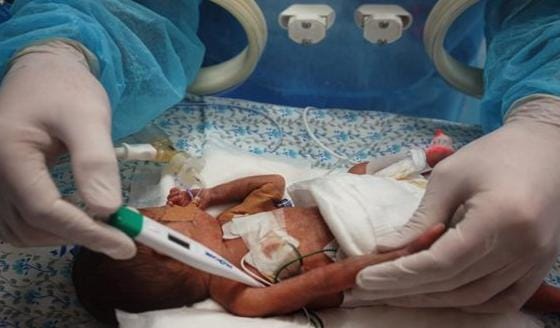
In the war-torn Gaza Strip, Moataz al-Zaanin embarked on a perilous journey from one pharmacy to another amidst the relentless shelling by the Israeli occupation forces. His mission: to secure milk for his hungry infants, a task that had become increasingly challenging due to the scarcity of essential supplies. The Israeli aggression, which commenced on October 7th, had sealed off the entry of basic necessities into the besieged Strip.
Al-Zaanin shared his harrowing experience with a correspondent from SANA. He risked his life by leaving the UNRWA shelter center located in the heart of Gaza. Braving heavy artillery and air strikes, he scoured the war-torn streets in a desperate quest for a can of milk for his five-month-old baby, but all his efforts proved futile.
The Palestinian father explained how he had been compelled to feed his infant an inadequate diet for his age, resulting in distressing intestinal problems as diagnosed by doctors.
Dr. Yahya al-Athamneh emphasized the dire situation faced by infants in Gaza, where they were deprived of the appropriate nourishment for their age. Even when some types of milk were occasionally available, they had to be mixed with contaminated water, posing serious health risks to the vulnerable children.
The doctor pointed out that the Israeli aggression had led to hundreds of cases of stomach and respiratory diseases among infants. The onslaught had ravaged the once healthy and environmentally sustainable way of life in the Gaza Strip.
Assem Hamdan, also residing in a shelter center in central Gaza after being displaced from his home in al-Zaytoun neighborhood, revealed a grim reality. All residents in UNRWA shelter centers were forced to consume contaminated water due to the shutdown of desalination plants caused by a lack of fuel.
Hamdan emphasized that the people of the Gaza Strip were enduring relentless shelling and massacres, coupled with the anguish of hunger and food insecurity.
Tragically, approximately 600,000 displaced and suffering individuals in shelter centers across the Gaza Strip were grappling with sewage pipe explosions and a mounting garbage crisis. The cessation of waste transport trucks, a consequence of dwindling fuel supplies, had exacerbated the dire living conditions in this war-ravaged region.
Meanwhile, Following the devastating Israeli aggression against the Palestinian population in Gaza and the West Bank, the Ministry of Health provided an update today, revealing a staggering death toll of over 9,299 individuals, with more than 25,000 wounded.
The Ministry’s statement disclosed that the Gaza Strip had witnessed 9,155 fatalities, while the West Bank reported 144 deaths. Furthermore, the ministry stated that 24,000 Palestinians in Gaza and nearly 2,200 in the West Bank had sustained injuries.
As of October 29, it was reported that approximately 1,950 Palestinians, including over 1,050 children, were unaccounted for, potentially trapped or buried under the rubble, awaiting rescue.
In a dire development, the Turkish Friendship Hospital, the sole cancer treatment facility in the region, had to suspend its operations due to continuous Israeli airstrikes and dwindling fuel supplies.
Out of the 35 hospitals in Gaza, 16 were currently non-operational due to Israeli bombing and fuel shortages. This fuel shortage had compelled doctors to carry out surgeries without adequate anesthesia, even for those injured in airstrikes and women undergoing cesarean sections.
Starting from October 7, Israeli authorities had prohibited patients in Gaza from seeking medical treatment in hospitals in Jerusalem and the territories occupied in 1948. This affected approximately 2,000 cancer patients and others in need of urgent care.




